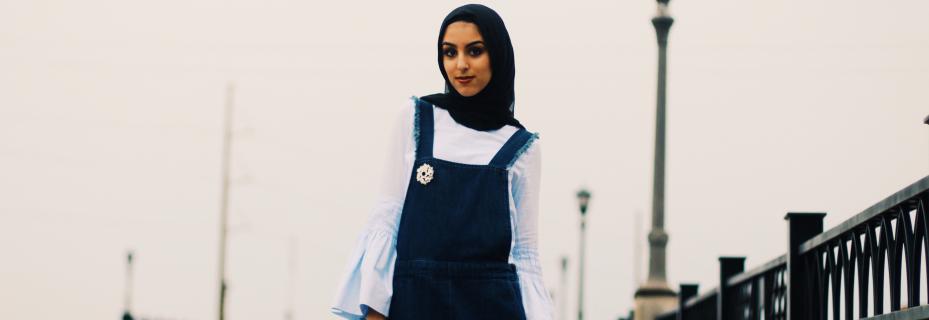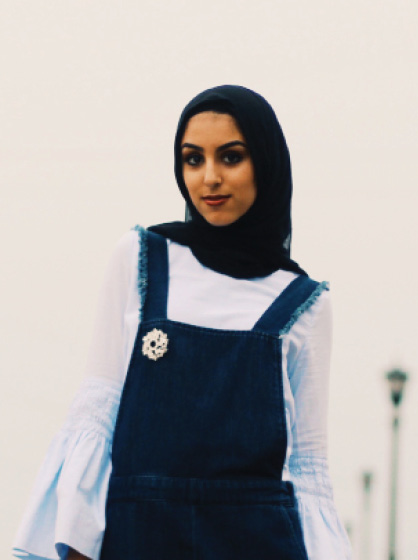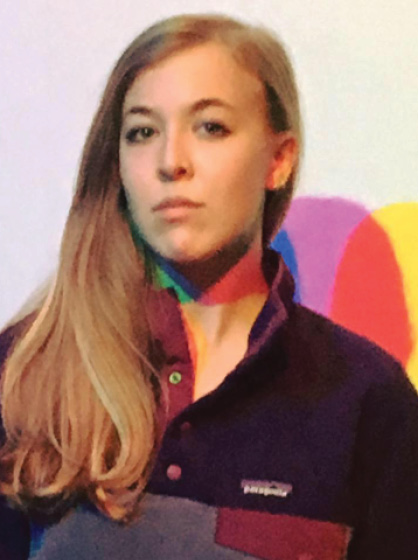TIBBETTS: To you, what does it mean to be a Syrian-American living in the Midwest? What is a defining aspect of that identity.
ABDULKARIM: I guess I have two answers to that question. My instinctive answer is that it’s just like asking any person what it’s like growing up in the Midwest, but the reality is that it’s like, yeah, I wear two pairs of socks in January, I have a really bad Minnesotan accent, and sometimes I get death glares depending on what the headlines have been like recently. I’ve lived in the Midwest my whole life, so I don’t know any different. This is my only reality, you know?
TIBBETTS: Before the interview, you told us that you were from the Minneapolis area, which is generally quite liberal. Do you feel accepted by this region? Does that change when you go to other parts of the Midwest?
ABDULKARIM: I get a lot of people who don’t think I speak English, and talk to me in hand signals until I’m done laughing to myself and speak up. Those are the funny times. But the glares are poisonous. I remember when I was waiting in line to get my picture taken after I passed my driver’s test, a gentleman with his wife looked back at me, shook his head in disapproval, and scoffed. And with things like this, it’s easy to not take it personally and channel inner confidence, but I’ve had to do this since I was five years old. I’ve been attacked based on visible declarations of my faith and it’s gotten worse as I made it more visible and as the blatant ridicule and antagonization my faith has been more and more normalized. It’s exhausting—and of course, there’s that character from my senior speech who asked why my religion oppresses women. One hundred percent of the time I feel like I’m Muslim before I’m me because I feel like I need to be a positive ambassador. I feel like the weight of all the stereotypes rests on my shoulders and that I personally need to prove all of them wrong, and that’s exhausting, too.
TIBBETTS: Do you feel that the Midwest is a different experience from other parts of the country?
ABDULKARIM: My only frame of reference for that is trips or vacations, but I remember once in Georgia my family had pulled up to park in a restaurant we were about to brunch in, Hijabs and beard and all, and before we had even gotten out of the car, we had all the eyes from the restaurant on us. We didn’t eat there that day, we just went to a Chick-fil-A. My optimist mind wants to say it’s just because the population there doesn’t see people who look different that often, but I’ve been proven wrong too many times since to be confident in that assumption.
TIBBETTS: Did these experiences and this feeling of needing to be Muslim before yourself influence your choice to attend St. Olaf College?
ABDULKARIM: Nope, that was a totally independent decision. My parents were hesitant to send me to a residential campus in this political climate, but I always insist that I’m not willing to base my life decisions on threats posed by racists. That’s giving into their attempt to alienate and differentiate us from society. I won’t let them hold me back and turn my community into the backwards, less educated population they want and expect us to be. I hesitate to use “us”, because I belong to many “us’s”, and the Muslim community is only one of them. I don’t consider myself exclusively a part of an isolated Muslim community, nor do any Muslims I know. We’re all parts of our neighborhood, school, etc., communities as much as any other American.
TIBBETTS: Along these lines, why did you choose to go to a Christian-affiliated college in the Midwest, especially considering today’s political climate?
ABDULKARIM: I trusted that a Christian-affiliated college wouldn’t be any different than another liberal arts college, and that its defining traits and strengths had nothing to do with that affiliation (granted I’d been assured no religious curriculum or conversion efforts would be forced on anybody). I guess it turned out to be a reciprocation of what I wish people would see in me - I’m a person with unique personality traits and I want that to define me, as opposed to attracting or repelling friends solely based on my religious affiliation. And so far, I made the right decision. I often forget that mine is a Lutheran college on a day to day basis.
TIBBETTS: Has going to this college affected your daily religious practice at all? Is St. Olaf drastically different from home and high school in that respect?
ABDULKARIM: I’ve found a balance of daily practice and incorporate religious philosophy and perspective into my everyday life. What I like about doing this away from home is that I get to expand core religious beliefs into tiny little mindfulness exercises during my independent activities. I actually find myself strengthening my faith at college, because I’m the only one holding myself accountable for the daily prayers and small practices, etc. Islam really stresses individual connections with God, and I get a lot more of that at college. Of course, I appreciate the community aspect I get at home, but this is another flavor of religious affirmation.
TIBBETTS: Where do you find your allies?
ABDULKARIM: I find my allies in friends who make it clear that they would defend me come what may - the fact that I wear the Hijab (which is a declaration of many things, only one of them being my faith), marks me as a Muslim even to strangers I hardly talk to in class, but who take pains to make sure I feel safe and supported when the political climate takes a hateful turn.
TIBBETTS: In connection, what communities are you involved with on campus? How do they contrast with those you interact with at home?
ABDULKARIM: I’m involved with the MSA and the Spanish Club, most formally. I don’t think the types of communities I am involved with have really changed, but the extent to which we can interact and blend on the same campus makes it a little more three dimensional. We see each other in passing when getting breakfast or when studying in the library, and seeing a familiar face that shares a cause or an interest with me makes me feel safe and understood.
TIBBETTS: Moving to a broader scope, Minneapolis recently elected a Muslim woman as a political representative. What did this mean to you?
ABDULKARIM: I wish I could say it was enough to ensure that my voice is heard, but I would like to see more national representation before I can be content. Not because Muslims deserve more marked representation than any minority, but because of the deliberate and blatantly voiced intent of borderline ethnic eradication of Muslims from this country. I made a promise to myself the night Trump was elected, and part of it was that I’d never allow myself to be treated as a second-class citizen in my country (The United States). My rights as a citizen are at stake and allowing that to happen to the Muslim denomination should be alarming to everyone, because it sets the precedent that the equal rights clause has loopholes if fear and lack of education about any group of citizens reaches a certain threshold.
TIBBETTS: From your unique perspective, what does the future look like?
ABDULKARIM: I wish I had the clarity to see. Hope is not gone, but I think I’ve already seen the best of America that I will live to see. If we get lucky in 4 or 8 or 80 years, I still think Trumpism is a blemish on the supposed American morals that I still retain faith in.
TIBBETTS: To wrap our conversation up, we want to give you the chance to take the floor. Is there anything you want to tell us? Any questions that we should, or must, be asking?
ABDULKARIM: It’s unfortunate, and this is a realization I’ve made at college, that half of my relationship with my religion is defending it from stereotypes, racist attitudes, and a misinformed, antagonizing stigma. My religion is one of peace, and I’ve lost sight of all the beautiful things that religion provides as a spiritual adherent because mine is under such disproportionate attack. I’m still learning to compartmentalize defense of my religion and separate it from my social activist side that wants to correct every attitude. But that’s not my job.
Any religious affiliation is a personal meditation of the most private and intimate nature. It therefore baffles me when being Muslim is falsely portrayed as an anti-nationalist political statement, or any political statement at all, let alone one that would appear on an ID. One’s adopted doctrine on how to live a life and idea of how the universe was created does not formulaically dictate probability for any kind of destructive behavior; not for Islam, any more than Buddhism, Christianity, or dozens of others. So, I don’t like to entertain the idea that I have to justify my validity as an American, peaceful world citizen, or success in any academic or extracurricular area. All people should judge me for is what I do and how I treat others.



